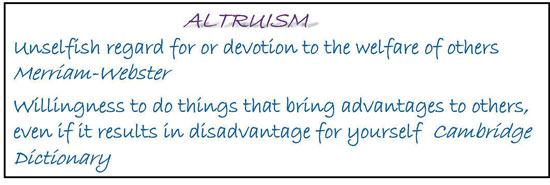Welcome back. Among the contractors who supported me during my 20 years as a scientist with the federal government was one who took time off to donate a kidney to his son. We marveled at his action, and our team’s thoughts strayed to those who donate organs to strangers at no benefit to themselves. What motivates them?
A recently published study by Georgetown University researchers with MIT and Linfield University collaborators took a step toward answering that question. They characterized the psychological profiles of 347 individuals who had performed costly or risky and normatively rare altruistic acts, labeling the individuals as extreme or extraordinary altruists.
Working in partnership with local and national organizations, the researchers recruited the altruists in 6 categories: 27 heroic rescuers, 132 kidney donors, 12 liver donors, 55 bone marrow or hematopoietic stem cell donors and 55 humanitarian aid workers. They also included 207 control participants that did not meet the criteria for any of the altruist categories.
In all, the battery of analysis measures took about an hour to complete. It included the HEXACO assessment of personality as well as measures of risk-taking, risk-perception, cognitive reflection, empathy and psychopathy, including social discounting and personal distress.
The six-factor HEXACO assessment captures dimensions similar to five-factor inventories (emotionality, extraversion, agreeableness, conscientiousness, and openness to experience). It also adds honesty-humility.
 |
| HEXACO personality traits (from en.wikipedia.org/wiki/HEXACO_model_of_personality_structure). |
Altruists’ Outstanding Traits
Statistical analyses (regression and logistic classification) highlighted the traits that best distinguished altruists from control participants. They were the traits most closely linked to unselfishness: increased Honesty-Humility, reduced Social Discounting and reduced Personal Distress.
Honesty-Humility captures values and behaviors related to seeking personal gain at others’ expense (i.e., exploitation); the relative valuation of outcomes for self over others. People who have high levels of Honesty-Humility have a low sense of self-importance and are unwilling to use, exploit or harm others to benefit themselves.
Social Discounting measures the value to a person of a reward to another person at a given social distance. In essence, the amount of money a participant is willing to forego to give a fixed amount of money to someone the participant hardly knows compared to someone close to the participant.
Personal Distress, sometimes called emotional contagion, refers to the experience of self-oriented distress when faced with negative experiences of others. Personal distress is a self-focused aversive response that results from the apprehension of another's distress.
Wrap Up
The researchers polled two independent representative samples of American adults, asking them to predict what traits distinguish altruists. The respondents did not specifically associate altruism with traits related to unselfishness. Instead they thought that the extreme altruists would be “better” in every way--more agreeable, more conscientious, more open, more everything. They leaned toward extreme altruists being perfect people.
But they’re not. It’s important to know that extreme altruists are not saints or guardian angels or all-around better. They’re just genuinely less selfish.
Thanks for stopping by.
P.S.
Study of extraordinary altruists in Nature Communications journal: www.nature.com/articles/s41467-023-37283-5
Article on study on EurekAlert! website: www.eurekalert.org/news-releases/986706


No comments:
Post a Comment